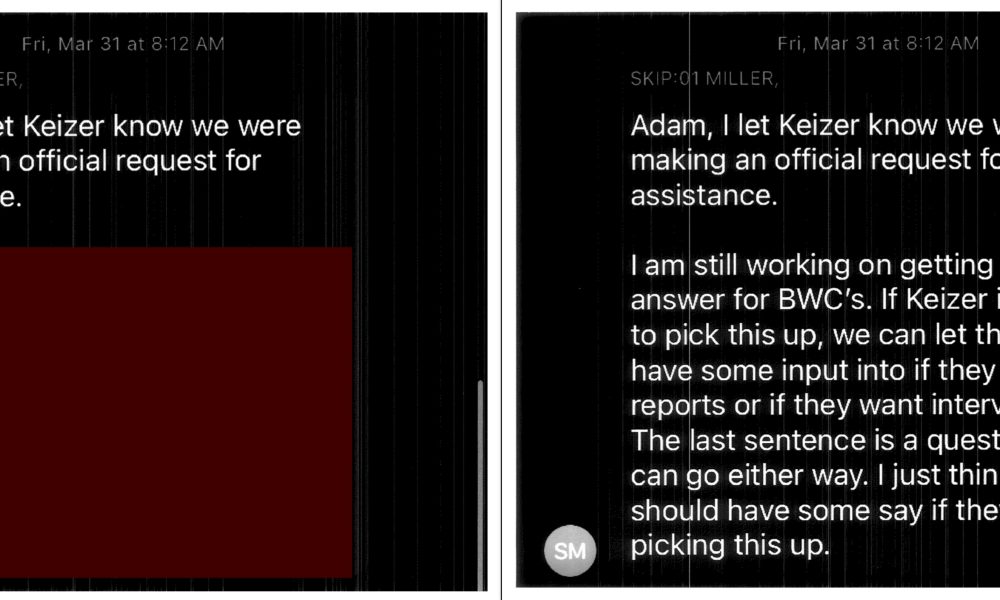Salem police coordinated more closely with the U.S. Drug Enforcement Agency than previously known to manage public information about its agent colliding with a cyclist, according to recently released records.
The Salem Police Department gave the federal agency an advance look at the first press release with details about the death of Marganne Allen as she rode her bicycle home along a Salem street on March 28. The city recently released the email, acknowledging that it should have been disclosed earlier.
The preview of the press release is notable because the police agency at the time identified the driver of a pickup truck but disclosed no role of the DEA. That came in a second press release two days later, on a Friday afternoon, in which Salem police disclosed the driver was a DEA agent.
The new disclosure underscored the special access the federal agency was getting into the investigation of one of its own employees. A Salem officer at the scene of the collision within minutes sent photos considered to be evidence to the DEA, records showed.
The disclosure comes as Marion County District Attorney Paige Clarkson recently ordered the city to turn over to Salem Reporter elements of other documents the city had blacked out.
Clarkson on May 23 directed the city of Salem to release records it wanted to keep from the public related to the investigation of the March collision.
Salem city officials complied with her order last week, releasing information the city previously tried to conceal by asserting a need to protect the criminal investigation into the fatal crash. Clarkson determined the city wasn’t justified in withholding the information.
But the district attorney allowed the city to continue withholding 24 photos an undercover Salem police officer texted to a DEA official within minutes of the crash. Clarkson allowed the confidentiality because “an objective and thorough investigation” needed to be completed. She did not address why the public shouldn’t see photos that city officials had so quickly released to the agency employing the driver.
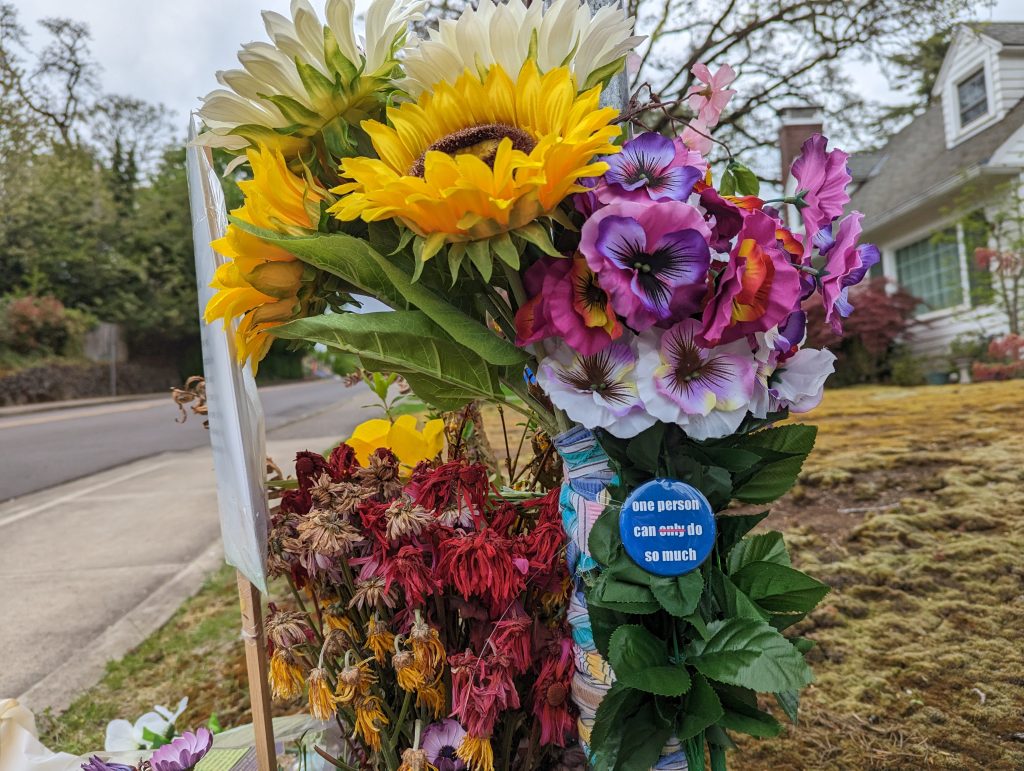
The mundane nature of the other records released under the district attorney’s order raises questions about the efforts of Salem officials to keep information out of public view.
The fully disclosed documents showed the city had initially blacked out routine communications between police agencies that the city portrayed as information from a criminal investigation. Instead, the documents showed, the redactions concealed what appeared to be efforts to manage the investigation.
The redactions appear part of a continued effort by Salem officials to blunt access to information about the March 28 collision.
“The city of Salem should not be allowed to conceal relevant information about its conduct,” Salem Reporter wrote in a May 3 petition to Clarkson’s office. “The apparent collusion between the Salem Police Department and the DEA warrants the fullest disclosure.”
Police investigating police
Authorities say the investigation continues into the crash that killed Allen, a state worker and local cyclist.
The investigating agency, the Keizer Police Department, submitted reports to prosecutors on May 12. Clarkson said in her disclosure order that prosecutors had asked the Keizer police to investigate the crash further. No charging decision has been announced.
A Salem Reporter investigation found that the driver of a pickup truck sped down Leslie Street through a central Salem neighborhood, drove past a stop sign without stopping and into the intersection at Southeast High Street where the crash occurred. Police identified the driver as Samuel Landis, 37, a DEA agent.
The fatality was initially investigated by Salem police but then was turned over to the Keizer Police Department. The Salem agency said it did so because of its partnership with the DEA in a local drug task force.
Records obtained by Salem Reporter last month through a public records request established that an undercover Salem drug investigator texted photos of the collision to a DEA official minutes after emergency crews arrived on the scene.
But Salem officials for weeks refused to release records related to its press release belatedly announcing the driver’s occupation and the transfer of the investigation to Keizer, saying the law allowed them to withhold records in “criminal investigations.”
Clarkson on May 23 partially sided with Salem Reporter, saying that disclosing some of the redacted information would not harm the investigation as the city contended.
She allowed the city to keep secret the photos sent by the undercover Salem police officer to a DEA official, saying the interest in “a complete investigation” outweighed the public interest in seeing the photos.
“This event is truly tragic,” Clarkson wrote. “All parties – the victim’s family, any potential suspect, and the community – have a vested interest in ensuring that an objective and thorough investigation can be completed. (Salem Reporter)’s argument that this was a ‘collision investigation’ and not a ‘criminal’ one is not a legal distinction. Every police investigation also determines criminal liability, if any. One that involves the death of an individual is certainly no different.”
She added, “The criminal nature of this investigation is further illustrated by the fact that the Keizer Police Department has delivered some investigatory information to the District Attorney’s Office … and is currently engaging in requested additional investigation.”
READ IT: District attorney’s order
Salem officials have not explained their attempts to keep secret information which the district attorney said only pertained to administrative matters.
City Attorney Dan Atchson said Monday that his office reviews and redacts documents before they are released to the public. He declined to explain why the initial redactions were necessary to protect an investigation.
City officials previously made a general claim to justify withholding documents.
“Evidence compiled during a criminal investigation contains information about the investigation, is maintained as part of the investigation, is provided to the prosecuting agency when the matter is referred for prosecution, and, if the matter is prosecuted, is provided to defense counsel during discovery,” Assistant City Attorney Lori Evans wrote in the city’s response to the petition.
The federal agency has previously said Landis would not comment and it hasn’t responded to a series of questions about the conduct of its agent.
And the Keizer police turned over records that were not released by the Salem police under a nearly identical request by Salem Reporter, which sought records explaining the decision to have Keizer lead the investigation.
Salem officials have provided no explanation for why the public records weren’t provided.
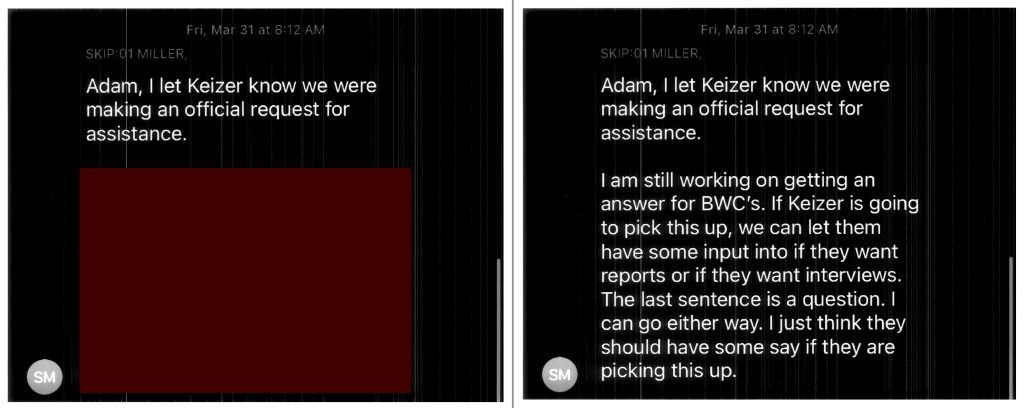
The Keizer agency on May 24 provided records of two text exchanges with a Salem police corporal that documented the request to take over the investigation.
Until then, it wasn’t clear how Salem settled on turning over the cycling case to Keizer. The city of Salem didn’t release or acknowledge either document in responding to a similar public records request by Salem Reporter.
By the city of Salem’s representation, there was no other record of the transfer of the investigation to the Keizer police.
City Manager Keith Stahley did not respond to an email Thursday asking why the city withheld the records without citing a legal reason to do so. Under Oregon law, public bodies can withhold records only by citing a legal basis.
Video obtained by Salem Reporter captured the pickup truck driving through the Gaiety Hill neighborhood, past the stop sign and into the intersection where the crash occurred.
Neighbors responded immediately at the time to tend to the injured cyclist, shielding Allen from the rain and traffic. Meanwhile, the driver spoke on his phone and paced around the scene but did not approach the victim, witnesses told Salem Reporter.
The news organization on April 6 requested records regarding communications between Salem police and the DEA, the press release which disclosed the driver was an agent three days after the crash, and the request for Keizer police to investigate.
Administrative secrecy
The city of Salem three weeks later released records which showed an undercover Salem police officer assigned to the DEA’s Salem task force took 24 photos of the scene and texted them to his DEA supervisor.
Salem officials wouldn’t publicly release the photos sent to the DEA about 21 minutes after emergency crews arrived on the scene. The city withheld the name of the undercover officer, citing a state law that protects their identities.
They also attempted to withhold the name of the DEA agent-in-charge based in Seattle who is responsible for the Northwest division and signed an October task force contract with the Salem police. The city initially claimed that disclosing the name would put the agent at risk of death, only to later review the claim at Salem Reporter’s request and release the document without the redaction.
In a March 31 text message released by the city, Skip Miller, a Salem deputy police chief, referred to an “official request for assistance” to the Keizer police. But the city blacked out much of the text and released no other documents showing such a request to Keizer. In the portion that was initially redacted, Miller said he believed Keizer police should have a say in what format information is collected for the investigation.
Salem officials also redacted portions of an email from Clarkson providing suggestions on the press release identifying the driver as a DEA agent. The March 31 statement, which went through several drafts, was the first public acknowledgement of the driver’s occupation.
And the city on May 12 acknowledged the existence of another previously undisclosed communication between Salem police and the DEA. Salem officials earlier said they had released all documents to Salem Reporter about such communications.
The records showed that Angela Hedrick, public information officer for the Salem police, sent two emails to a DEA public information officer, Alison Grande, a day after the collision.
The first email, sent at 11 a.m., contained a draft press release about the collision with no other explanatory information. That version of the statement did not identify the victim or the driver by name and incorrectly listed the victim’s age.
Hedrick then sent another email to Grande about two and a half hours later with an updated press release, which named both the victim and the driver. City officials revealed that the email was sent one minute before the Salem police publicly issued its first press release about the crash, identifying the driver by name but not his occupation.
Salem Reporter requested such documents on April 6, and the city did not release the emails to the DEA until May 15.
The city released no record of any responses from the DEA.
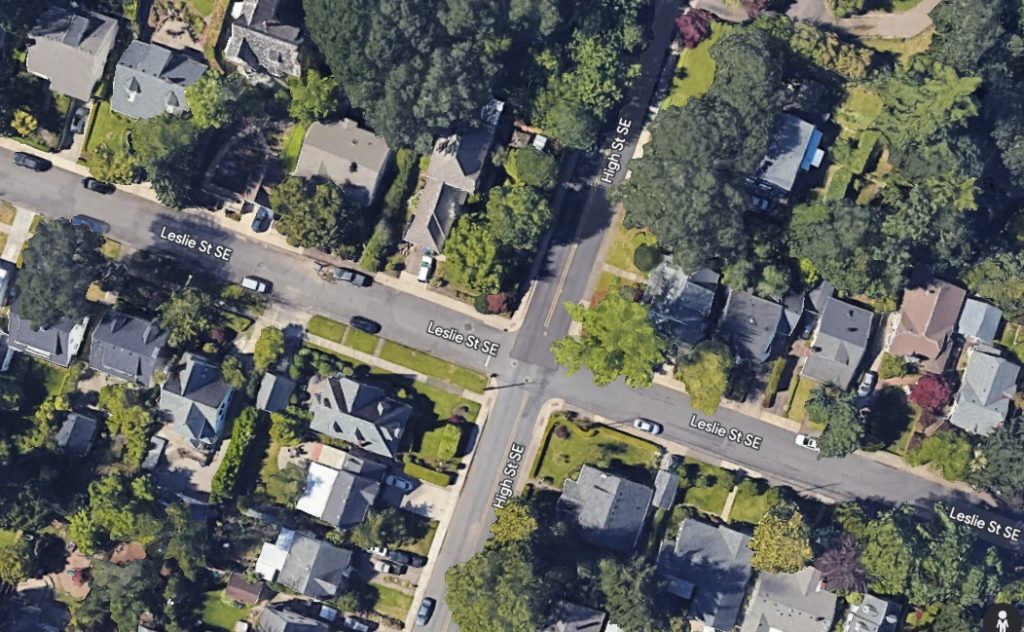
On May 3, Salem Reporter petitioned Clarkson for an order requiring the city to release the documents in full, arguing that their release was in the public’s interest and the delay in disclosure was impeding that interest. The news organization also contended that state law requires public agencies to balance public interest in disclosure against the exemption allowing withholding of information related to a criminal investigation.
“Consider the circumstances,” Salem Reporter said of the delayed disclosure in its petition. “There is one possible suspect – a federal drug enforcement agent. He has training in criminal investigations. He knows what evidence there is and can be found. His agency was provided crime scene photos almost immediately after the accident – an extraordinary disclosure. There is no risk that the suspect would flee. There is no risk at this point that the suspect can conceal evidence. This is not a ‘whodunit.’”
READ IT: Salem Reporter’s petition
Assistant City Attorney Lori Evans said in her response a week later that releasing unredacted records related to the press release and the request to Keizer “would be detrimental to the outcome of the case.”
“It is in the public’s interest to allow the police to complete the investigation, the District Attorney to review the matter, and if there is criminal culpability, to hold the appropriate person accountable. The first step in that process is allowing the criminal justice system to work as it is designed to; without compromising the process,” Evans wrote.
READ IT: City response to petition
Salem Reporter challenged that justification, arguing the city has not explained why the driver’s employer is entitled to photographic evidence of the collision but the people of Salem are not.
“At Salem Reporter, we act on behalf of Marganne Allen and a community that deserves the truth,” the petition said. “This is one of those extraordinary cases where there should be no reflexive claim to exemptions. To hold fast to those exemptions tells the community: We’ll disclose evidence to our law enforcement friends but you can’t be trusted with it.”
READ IT: Salem Reporter’s rebuttal
Clarkson said in her order that she found the redacted portion of her own email was “merely an administrative fact statement, rather than one compiled for criminal law purposes as part of the investigation.”
She also found that a text message from Miller to a Salem police corporal “is discussing administrative decisions and not otherwise compiled for criminal investigatory purposes.”
Clarkson ordered the city to disclose the documents to Salem Reporter “as soon as practicable.”
The records released under Clarkson’s order expanded on the text from Miller to Salem police Cpl. Adam Waite, the only documentation of the transfer to Keizer.
“I let Keizer know we were making an official request for assistance,” Miller wrote. “I am still working on getting an answer for BWC’s.” The acronym is a common law enforcement term for body-worn cameras.
The newly released records also showed Clarkson told Salem police officials on March 31, three days after the crash, that she would personally handle the case.
“I will be Keizer’s contact on this going forward. Our on-call DDA at the time of this incident is switching assignments so I’m going to take her off the hook on this,” Clarkson wrote. “I may not be the ultimate ‘reviewer’ of info, but it’s simpler this way at this point.”
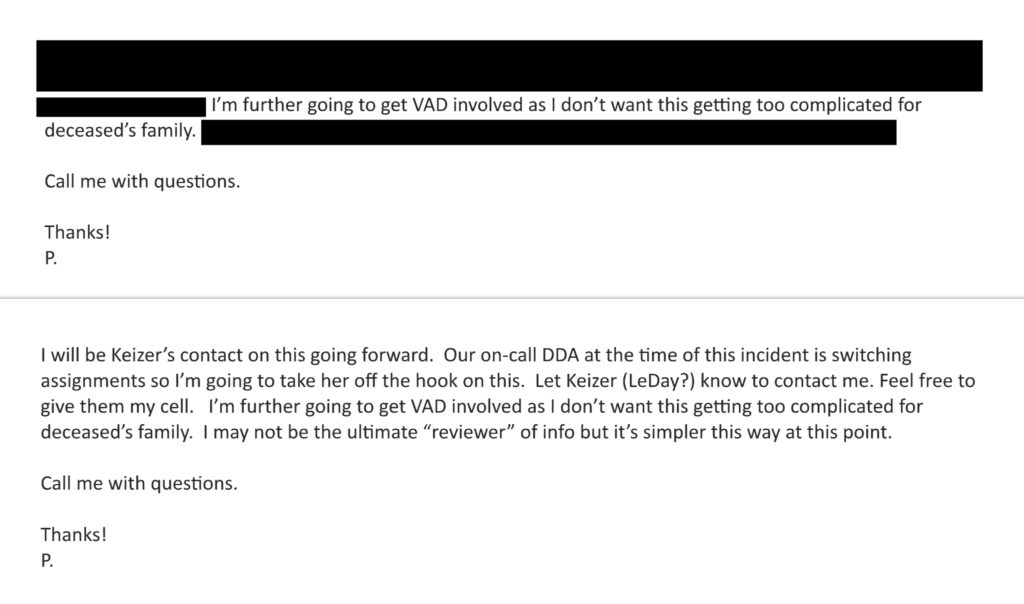
Records released to Salem Reporter by Keizer include records involving the Salem police that that agency failed to disclose or indicate it had. This included text messages about managing the investigation.
The records showed Waite texted a Keizer police official the day after the crash. “Do you have a few minutes for a call about a crash we worked yesterday,” he asked.
Waite then arranged with a Keizer officer to meet the following morning on Liberty Street near the collision scene.
Court records as of Friday, June 5, show no record that the DEA agent has been charged in connection with Allen’s death.
RELATED COVERAGE:
Video shows driver ran stop sign in fatal collision with Salem cyclist
Salem police gave evidence to DEA minutes after agent’s fatal collision with cyclist
Keizer police won’t say if DEA agent was cited for crash that killed cyclist
Police identify bicyclist killed in central Salem accident Tuesday
Contact reporter Ardeshir Tabrizian: [email protected] or 503-929-3053.
SUBSCRIBE TO GET SALEM NEWS – We report on your community with care and depth, fairness and accuracy. Get local news that matters to you. Subscribe today to get our daily newsletters and more. Click I want to subscribe!

Ardeshir Tabrizian has covered criminal justice and housing for Salem Reporter since September 2021. As an Oregon native, his award-winning watchdog journalism has traversed the state. He has done reporting for The Oregonian, Eugene Weekly and Malheur Enterprise.

